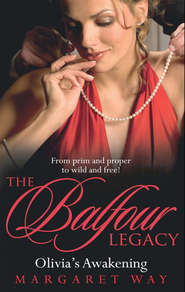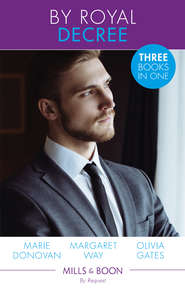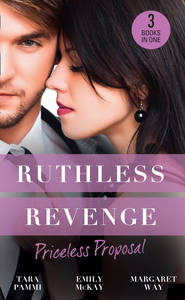По всем вопросам обращайтесь на: info@litportal.ru
(©) 2003-2024.
✖
The Horseman
Автор
Год написания книги
2019
Настройки чтения
Размер шрифта
Высота строк
Поля
Cecile gritted her teeth. “Do you want to miss your plane? I’ve had a license since I was seventeen, Stuart. I’ve never had an accident, which is more than I can say for you.”
“Don’t be so touchy!” He raised his brows. “I know you’re a good driver, very controlled and decisive about what you do, but this is a big powerful car. Women shouldn’t really drive big powerful cars in my view, and you do have a worrying tendency to be impetuous, especially if you’re running late. As for my one accident, how was I to know a bus was going to pull out in front of the car ahead of me?”
“By studying the road well ahead,” she said tartly. “Look, let’s stop this, shall we?”
“Certainly. I’m sorry, darling. I apologize. I was jealous. I freely admit it, but I can only say what I fear. To get to know this Montalvan would be to court danger. Knowing your grandfather, the guy’s bound to be offered plenty of entertainment while he’s here. He’s not a suitable companion, that’s all. I’m five years older than you. I work in an area where I see a lot more suspect characters than you.”
“To hell with that!” she said hotly. “Do you see children and adolescents who’ve been sexually, physically and mentally abused? Do you see suffering on the grand scale? Little people who’ve been beaten, burned, tied up with rope or whatever is to hand, had their bones broken, their bodies violated and infected, been threatened with weapons? The most you see, Stuart—you’re so bloody pompous at times—is white-collar crime. The socially prominent scoundrels you help beat the charges.”
“Well, really, that’s a bit extreme, isn’t it?” Stuart’s voice was taut with shock. “And there’s no need to swear. It scarcely suits you. I’ve never heard you call me pompous before.”
“Clearly, sometimes you are!”
“This is too much, Ceci,” he complained. “Personally I don’t believe attack is the best form of defense. All I was saying is I don’t think business-pleasure is all there is to it with this Montalvan guy.”
“Why don’t you have him investigated?” she suggested, suddenly very aware of Stuart’s tendency to patronize her. “That should solve the problem.”
Stuart, the lawyer, took the suggestion seriously. “It could be done,” he said, nibbling hard on his lip. “All that charm, the expensive clothes, the handmade shoes, the solid gold watch, the meticulous grooming—it could all be window dressing. He could be an experienced con man, for all we know. There’s nothing would suit a con man more than to latch on to a beautiful heiress. Seduce her if he could. He certainly latched on to you and your grandfather.”
So he did, said that harsh little voice in her head. He made a huge attempt to reach you and succeeded. As a man, Raul Montalvan was very, very seductive. It was one way to cut across all borders.
“You can’t deny it’s a possibility.” Stuart frowned as he searched her tense profile.
“Fascinating if you were writing a novel, Stuart, but I haven’t the slightest doubt Señor Montalvan is who he says he is. I think you’ll find he comes from a wealthy well-respected family. Bruce and Fiona must know all about him. I’m sure you could find the Montalvan estancia on the Internet, as they breed polo ponies.”
“Maybe he’s using someone else’s identity,” Stuart suggested, still frowning hard. “It’s been done before today. Australia is a long way from Argentina.”
She clicked her tongue angrily. “Nowhere is a long way from anywhere these days. Granddad would soon discover if Raul knew little about ranching, and polo isn’t the sport for a man without means. Besides he has all the graces expected in the son of a cultured family. He’s bilingual. I wouldn’t be a bit surprised if he didn’t speak other languages, as well. Italian, French, who knows?”
“I’m getting the strong impression you admire him,” Stuart said angrily.
“I’d say a lot of people admire him,” she said dryly. “Actually, Stuart, I’m on side with you. For all his charm, there’s something mysterious about Raul Montalvan. Something steely, possibly dangerous? He’s an enigma.”
Stuart reeled back at some note—perhaps betrayal—in her voice. “Aw, bugger that!” he said with a burst of violent jealousy. “All I know is, such men are best left alone.”
Such a pity, then, you’ve already burnt your fingers!
CHAPTER FIVE
CECILE GAZED DOWN the beautifully appointed dinner table, her eyes on her grandfather, who was swirling a deep ruby wine around his crystal goblet before drinking it and nodding to Robson, the major domo responsible for running the domestic affairs of the mansion smoothly. Her grandfather had always kept an excellent cellar, the best wines from home and around the world. The conversation at a table for fourteen guests eddied around her, her grandfather at one end, Great-aunt Bea at the other. The guest of honor for the evening was a well-known political figure, Senator Brendan Ryan. He sat to her grandfather’s right, her mother to his left. She herself sat a few chairs away with Raul Montalvan sitting opposite her across the gleaming table, set with the finest bone china, sparkling crystal and solid silver flatware. A set of six beautiful caryatid candlesticks, her favorites, supporting tall white tapers were set at intervals down the table. Her late maternal grandmother, Frances, had acquired them in London when she and her grandfather were on their honeymoon. Grecian goddesses rose from domed circular bases to support the wax pans and sconces above their heads. Her grandmother had always promised them to her. Frances had doted on her, whereas Justine claimed she had spent a lifetime trying to gain her mother’s love and attention. Sadly, from all accounts it was true. It was her uncle Jared, her mother’s late brother, who had been the apple of Frances’s eye. She had adored him to the exclusion of her daughter, a deprivation that had badly affected Justine and perhaps explained her unswerving, single-minded focus on her only child.
The scent of the wines mingled with the scent of the flowers in the low, very beautiful central arrangement of white lilies and orchids. Montalvan wasn’t looking at her. He was talking to her friend Tara Sinclair, his tone too low for her to hear, but it was easy enough to read Tara’s expression. She looked enthralled.
There, what did I tell you? It’s not difficult for any woman to become infatuated with an exciting man. Possibly he doesn’t even realize his hypnotic powers. Then again he most assuredly does.
Tara threw back her blond head and laughed. She was wearing a red silk dress cut low to show the upward swell of her breasts. She had lovely creamy skin, not a conventional beauty but attractive and vivacious. She and Raul appeared to be drawn together in an intimate joke. A peculiar feeling akin, not to jealousy, but to rejection rose in her. She had made a fool of herself the other night. She had quarreled with Stuart, sending him back home to Melbourne with no harmony between them. Of course he had since rung any number of times from his apartment and from work, but during these intervening days she had agonized over, not whether, but when to call off the engagement. She knew her mother’s reproaches would go on forever, Stuart being her mother’s idea of an excellent match.
I can’t believe what you’re thinking, girl!
She was beginning to tire of her inner voice. She hadn’t really done anything stupid, thank God. She took a sip of her wine, no more, quickly turning to one of her old beaus, an architect, newly married, as he asked for her impressions of a recent showing of aboriginal art they had both attended. She was happy to tell him. It took her mind off Raul and Tara.
After dinner her grandfather asked her to play for them, as she’d known he would. She was a gifted pianist. Glad, in the end, her mother had forced many long hours of practice on her, so that she had collected a clutch of diplomas, all high distinctions, even before she left school. Ordinarily she was happy to perform for dinner guests, but tonight his presence made her incredibly nervous when nervousness had been bearing down on her all day.
Everyone took their seats in the living room, all in wonderfully mellow spirits, induced by good conversation and a truly memorable dinner. It had been definitely on the sensual side, with superb oysters topped by caviar, succulent garden-fresh asparagus to accompany the melt-in-your-mouth beef and small pots of velvety smooth, ever-so-seductive chocolate mousse to finish. Certainly Raul Montalvan appeared to have enjoyed it. She had the idea that in nineteenth-century France a bridegroom was encouraged to eat several helpings of asparagus before joining his bride in the connubial bed, just as Montezuma consumed copious amounts of hot chocolate before visiting his harem. Just looking across the table had been enough for her to be devoured by her senses.
Her grandfather went to the big Steinway grand, lifting the lid. It was a small task he loved. Her mother played, or rather, had played until her daughter’s abilities had overtaken hers. After that, Justine never touched the piano again, which was an awful shame, because Justine desperately needed the relaxation. The magnificent Steinway her grandfather had bought Cecile some ten years back replaced the fine old Bechstein her mother had learned on.
Cecile settled herself on the ebony piano seat already adjusted to her height and particular requirements. Knowing she would be asked to play, she had spent an hour or so of the preceding days practicing. Her hands were slender, long-fingered, deceptively strong. Her technique had never let her down. Tonight, unfortunately, her emotions were all over the place. Should she not play well, her mother would be deeply disappointed in her and make a point of telling her so afterward.
Cecile bowed her head over the keys, her long graceful neck revealed by her hairstyle for the evening, an updated chignon. Normally she was very comfortable in this setting, surrounded by family and friends, none of them, outside of her mother, critical. For a moment her nervousness threatened to overwhelm her. She glanced up at the ceiling; the ceiling stared back. God, she was nothing without her confidence. No performer was. Someone was laughing, a soft little giggle. Sounded like Tara. Etiquette demanded an audience be quiet, but it was hard to quiet Tara, who wasn’t a music lover, anyway.
What was happening to her? Stage fright? Panic attacks could happen right out of the blue. She had seen them with sad regularity in the course of her work, but she had never actually experienced one until she’d laid eyes on Raul Montalvan.
Play something easy. Start with a couple of Chopin waltzes. Everyone just wants to enjoy themselves.
She glanced down at her hands, wondering if she had simply lost it.
Then suddenly he was approaching the piano, asking her very charmingly if the Spanish composer Albeniz was included in her repertoire. He pronounced the composer’s name in the Spanish fashion. She had never heard it sound so good. She had intended to start with a Brahms rhapsody, but Spanish music had always captivated her. She had kept up the repertoire. Why, given he was South American, had she not thought of it herself?
“As long as you don’t expect me to measure up to the great Alicia De Larrocha,” she said, finding she was able to breathe again.
“You’re an artist, I’m sure.” He looked deeply into her eyes. Then he moved back to his position on the sofa between Tara and Great-Aunt Bea, who claimed to have been in her youth—she was now seventy-eight—a regular love goddess. Bea certainly liked good-looking men, never depriving herself of their company.
The lights turned on again in her brain. Normally she would never have started with the very difficult “Malaga,” one of the most passionate pieces of Albeniz’s great work for piano, Iberia, but the fact he had come to her aid—his eyes told her that—fired her blood. She turned with a smile to announce to the room what she intended to play. She saw her grandfather clap with delight, turning his head to say a few words to his Argentinian guest. Bea gave her such an animated wave of her heavily bejewelled hands, Cecile thought for a moment she might get up and dance; her mother sat with a slight frown as though doubting whether, without practice, she could pull it off.
Thank you, Mother, for the vote of confidence.
She knew well how difficult it was to treat children whose parents, especially the mothers, were overly demanding. Her old professor at the Conservatorium had always refused to let her mother sit in on any lesson, even rehearsals for exams. Helicopter mothers, Cecile, forever hovering over their children. I cannot abide them!
She sat quietly for a moment before the keyboard, bringing all her concentration to bear. Then when she was ready she launched into the piece that in essence represented the wonderful dance rhythms of the malaguena.
NEVER FOR A MOMENT had he allowed his purpose for coming here to fade from his mind. What he wanted was revenge. It was a kind of mania, really. Sometimes more than others—when he was riding alone far out on the pampas—he saw himself as a grown man bound by the vows of his youth. A boy lost, his face hot and flushed with tears for all the misfortune coming his beloved grandfather’s way. It was obvious even to him forces were at work to drive them off their land. Land that one day would be his. Land was everything. It spoke to him with a passion. There was an explanation for what was happening.
The Morelands.
“They’re determined to ruin us!” He wasn’t sure how he was going to achieve revenge—strip a powerful man of at least some of his prestige—but he was hoping ways and means would present themselves as he was drawn deeper and deeper into their world. He had achieved his prime objective of working his way in with little difficulty. It had turned out to be so easy he could scarcely believe it. He had the motivation, now he needed the necessary guile. There would be opportunities. This family, like all families, had secrets. Dark, damning secrets that needed to be exposed to the light of day and public censure. Since he’d been a boy he had dreamed of striking a blow at the family responsible for his own family’s long years of suffering and exile: the Morelands, with their powerful army of sympathizers and supporters.
His mother had found peace in her second marriage, giving birth to Francisco, his stepfather Ramon’s heir, then two years later, little Ramona. His own father, who had been enticed to Argentina to play polo and was later employed by Ramon to help breed his polo ponies, was long dead, dying in hospital a few days after taking a bad fall at a home match. He would have survived the fall, only it was his blighted destiny to be trampled by his agitated pony. Polo, the way the gauchos played it, was dangerously fast in what was the fastest game in the world. What had happened to his father should have put him off playing polo for life, but he, too, thrived on the element of danger. Horsemanship was in his blood. He had inherited his father’s speed and finesse and his near-complete range of strokes. Unlike his father when he played it was with one objective in mind: to win. He knew Joel Moreland had been a fine, enthusiastic player. He knew his son Jared rode as hard and fearlessly as the best. He knew a great deal about Jared Moreland, the predator, canonized in death.
What he hadn’t anticipated was meeting this beautiful creature, Jared Moreland’s niece. She couldn’t be allowed to get in his way. Then again, he knew he had her at his mercy. If he could only bring himself to be so ruthless, she could play a big part in showing the all-powerful Morelands what it was like to suffer. He relived the moment he’d looked up to see her standing above him on the central balcony of the mansion. She had appeared in her wedding finery like some splendid apparition or a beautiful illustration out of one of Ramona’s golden books of fairy tales. Her gown was a lustrous silver. She wore a crown of flowers on her head. That first sight of her might well haunt him the rest of his life, he thought bleakly. Just the sight of her had made him think for the first time he should be building his own life, not forever seeking revenge for a past that was gone. Were the vows he had made eternally binding? Why had she made him feel they no longer meant anything?
For long moments he’d been a stranger to himself. She hadn’t been aware of him, so he continued to stare with this queer hunger, as a man might stare at the unattainable. She shone in her bridesmaid’s gown. Her skin gave off a lovely, luminous glow. Her effect on him was unprecedented in his experience, when his family’s adopted Argentina was full of beautiful women, his for the asking. He had not dreamed of this, when it was essential he remain true to himself.
She had turned her head; stared down at him, her beautiful face unsmiling. Impossible to smile at that moment. He remembered he’d saluted her in some way. She had acknowledged him, regal as a princess. He’d wanted to climb up to her, using the thick, flowering trumpet vine that wreathed the white pillars as purchase for his eager feet. He was a passionate slave to beauty in all its forms, but for no woman had he been aflame with a terrible desire. It was unimaginable she should be a Moreland.
He had known that at once. She was Cecile Moreland, very much her grandfather’s princess and heiress. She was far more beautiful in the flesh than in her photos in newspapers and the social pages of magazines, arresting as they were. He’d made it his business to find out everything there was to be learned about the Morelands. He already knew much, since he had lived with that hated name since his childhood. He had started his updated research with the Man with the Midas Touch, Joel Moreland. He now knew where every member of the entire clan lived, what they did for a living, the circles they moved in, their particular friends, their habits. He might have been commissioned to write an unauthorized book on the family, entitled A Study of the Morelands. Joel Moreland, the patriarch, father of the dead Jared, was way up there with the richest men in the country. His interests were vast. He doted on the young woman who now sat at the piano, her raven head bent over the keys.
She could complicate things drastically if he allowed it. Or she could become the all-powerful pawn. He had no stomach for causing grief to a woman—certainly not one who had so easily ensnared him—but he couldn’t forget how much the women of his family had suffered. His grandmother, his mother, his aunts. The entire family had been forced off the land as his grandfather went deeper and deeper into debt. Land that one day his grandfather had promised would be his. Land was everything. Only, his grandfather had gone bankrupt. His creditors had moved in and they had moved out. Exile was like an amputation. There was an explanation for it all, the never-ending problems and misfortune. The way the family was ostracized.











